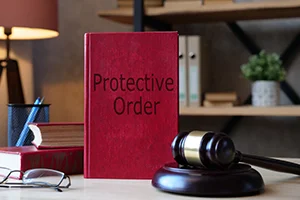

In North Carolina, protective orders safeguard individuals from abuse, violence, or harassment. Here’s a comprehensive, legally precise, and concise guide.
1. Domestic Violence Protective Orders (50B):
2. Civil No-Contact Orders (50C):
Residency Requirement: Plaintiff usually files in their home county, or where the abuser resides or the incident occurred.
Legal Representation: Both parties may have separate legal representation in hearings.
50B Order Implications: May require vacating home, paying support, and temporary loss of custody rights.
50C Order Implications: Restrictions on movements, including workplace access.
50B Violation: Class A1 misdemeanor, punishable by prison time and fines.
50C Violation: Criminal contempt with possible reprimand, imprisonment, fines, or a combination.
Understanding the specifics of protective orders in North Carolina, including their types, filing criteria, and legal implications, is crucial. These orders play a vital role in ensuring safety and justice, and navigating them correctly is essential for all involved parties. Our attorneys are to navigate you through the process.
Featured Legal Services
Trust & Estates in Waynesville, NC
Trust & Estates in Madison, NC
Trust & Estates in Asheville, NC
Waynesville Probate Lawyers
Madison Probate Lawyers
Waynesville Real Estate Lawyers
Madison Real Estate Lawyers
Asheville Real Estate Lawyers
Waynesville Family Law Lawyers
Madison Family Law Lawyers
Asheville Family Law Lawyers
Waynesville Office:
37 Church StreetMarshall Office:
32 N. Main Street Marshall , NC 28753 © 2024 Selena A. King PLLC • Built with GeneratePress Manage ConsentTo provide the best experiences, we use technologies like cookies to store and/or access device information. Consenting to these technologies will allow us to process data such as browsing behavior or unique IDs on this site. Not consenting or withdrawing consent, may adversely affect certain features and functions.
Functional Functional Always activeThe technical storage or access is strictly necessary for the legitimate purpose of enabling the use of a specific service explicitly requested by the subscriber or user, or for the sole purpose of carrying out the transmission of a communication over an electronic communications network.
Preferences PreferencesThe technical storage or access is necessary for the legitimate purpose of storing preferences that are not requested by the subscriber or user.
Statistics StatisticsThe technical storage or access that is used exclusively for statistical purposes. The technical storage or access that is used exclusively for anonymous statistical purposes. Without a subpoena, voluntary compliance on the part of your Internet Service Provider, or additional records from a third party, information stored or retrieved for this purpose alone cannot usually be used to identify you.
Marketing MarketingThe technical storage or access is required to create user profiles to send advertising, or to track the user on a website or across several websites for similar marketing purposes.